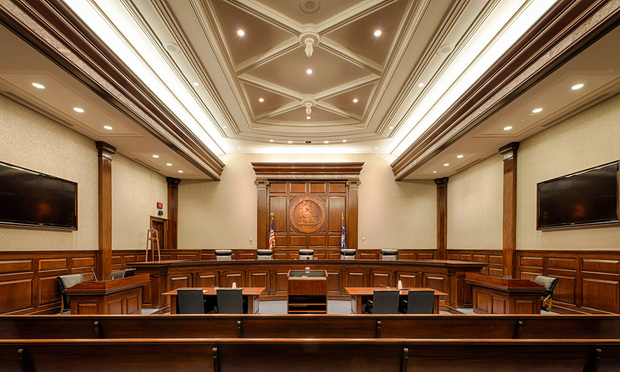 Photo: Shutterstock.com
Photo: Shutterstock.com
The little things show how she's changed.
 Connecticut Supreme Court Justice Maria Araujo Kahn no longer watches violent movies. It's only comedies now, or "happy movies where everyone is treated nicely" for the jurist whose in-court responsibilities follow her far beyond the bench. Kahn once adjudicated a case involving cannibalism, and oversaw the trial of a defendant accused of possessing more than 100 videos of child pornography.
Connecticut Supreme Court Justice Maria Araujo Kahn no longer watches violent movies. It's only comedies now, or "happy movies where everyone is treated nicely" for the jurist whose in-court responsibilities follow her far beyond the bench. Kahn once adjudicated a case involving cannibalism, and oversaw the trial of a defendant accused of possessing more than 100 videos of child pornography.
She and other judges say the black robes of justice are becoming increasingly heavy.
Adjudicating major conflicts, handing down decisions with far-reaching consequences, and sometimes wielding the power of life and death is a formidable responsibility, one that leaves judges exhausted and often traumatized, according to a study by the American Bar Association's Commission on Lawyers Assistance Programs.
The stress sometimes leads to high blood pressure, insomnia, stress and other telltale signs of the burden jurists carry, the study suggests.
"I'd have raw emotions bubbling up in me," said Robert Devlin Jr., a Connecticut Appellate Court judge who spent decades handling criminal cases on the Superior Court bench. "It takes a toll on you, especially after 26 years."
'Cases stick with you'
Many in her courtroom didn't know this, but Kahn often kept her feelings at bay in the courtroom by looking down and writing notes, sometimes avoiding eye contact with the people appearing before her.
"It can be very hard to keep your emotions in check when hearing from victims' families, and also at times, from the defendants' families," the judge said. "Those cases stick with you."
And their effects can be unexpected.
A television crime show about a serial murderer or cannibal might reawaken emotions, so the judge has learned to avoid them.
"They tug at your heart," Kahn said. "Seeing images outside of court will trigger memories from in court.
Top 20 Sources of Judicial Stress
- Importance/impact of decisions — 79.7%
- Heavy docket of cases — 73.2%
- Unprepared attorneys — 67.6%
- Self-represented litigants — 62.5%
- Same parties repeatedly, but not addressing underlying issues — 58.1%
- Public ignorance of courts — 55.5%
- Long hours of work without break — 53.5%
- Hearing contentious family-law issues — 50.3%
- Isolation in judicial service — 50.3%
- Insufficient support staff — 49.5%
- Counsel's increased incivility, unprofessionalism — 48.5%
- Unable to hear as many cases as needed — 47.9%
- Cases involving severe trauma/horror — 45.9%
- Inadequate compensation structure — 47.3%
- Running for office/reelection — 41.6%
- Courthouse security concerns — 41.4%
- Increased use of electronic media — 37.2%
- Concern for personal or family safety — 37.1%
- Staffing cuts and turnover — 35.9%
- High-profile cases — 35.7%
Source: 2019 National Judicial Stress and Resilience Survey
Organizations, such as the National Center for State Courts, appear to be taking note. The group publishes a Judicial Stress Resource Guide that addresses the link between budget cuts and low morale among court employees; a connection between obesity and judicial stress; burnout, emotional labor; misconduct among jurists; substance abuse; personal strain and other issues.
And the American Bar Association's Commission on Lawyers Assistance Programs took an in-depth look with a study released at a national conference in Austin, Texas, in September.
The group surveyed 1,034 judges to identify key stressors and solutions.
One dark takeaway: 2.2% of the judges who responded to the survey said they had thoughts of injuring themselves or of committing suicide. And in the last two years, at least two judges—one from Florida and one from Georgia—died by suicide.
Few judges get to that low point, thanks to wellness strategies they've developed over years on the bench.
Kahn, for instance, spends time visiting schools to speak to children about the law. And Superior Court Judge Robert Abrams does community theater, while Devlin would walk for one mile from the Bridgeport courthouse to Seaside Park.
"Those walks helped," he said. "It just takes something out of you to constantly hear these cases. There is an emotional drain."
'Harder than people think'
Devlin said he's found himself pulling back while on the bench in some instances.
"Sometimes, it's hard to hold the emotions in check. I'd find my voice crackling sometimes, and I need to push that all back into me and just do my job," he said. "I can tell you that sentencing took a lot out of me, because you'd see people emote in front of you. It was very painful, not just for the defendants or victims as their stress was evident, but also their families and friends and others affected."
Pullman & Comley member and retired Superior Court Judge Robert Holzberg said he would on occasion get angry at certain situations, but worked hard not to show that anger on the bench.
"There is no magic bullet to managing stress and the emotions that come with being a judge," he said. "The response to stress is individualized."
Kahn agreed.
"The overall stress of the job is harder than people think," she said. "You can't fully comprehend the awesome responsibility of the job, and the stress that comes with it."
Plus, there are other job pressures, including administrative responsibilities such as handling busy dockets, managing courthouse personnel, and juggling a public performance review.
"Judges in Connecticut are subject to reappointment every eight years," Holzberg said. "It's a stressor for many judges as it gets closer to that eight-year mark."
Different courtrooms give rise to varying concerns.
"The greatest stress for me comes with knowing that almost always, we are making the final decision in a case," said Richard Palmer, an associate Connecticut Supreme Court justice since 1993. "There is a lot of responsibility with that."
Sometimes, the weight of the justices' responsibility is especially clear during oral arguments.
"There is no particular strategy for dealing with it," Palmer said. "I just do it."
Read more – Minds Over Matters: An Examination of Mental Health in the Legal Profession
This content has been archived. It is available through our partners, LexisNexis® and Bloomberg Law.
To view this content, please continue to their sites.
Not a Lexis Subscriber?
Subscribe Now
Not a Bloomberg Law Subscriber?
Subscribe Now
NOT FOR REPRINT
© 2025 ALM Global, LLC, All Rights Reserved. Request academic re-use from www.copyright.com. All other uses, submit a request to [email protected]. For more information visit Asset & Logo Licensing.
You Might Like
View All
An ‘Indiana Jones Moment’: Mayer Brown’s John Nadolenco and Kelly Kramer on the 10-Year Legal Saga of the Bahia Emerald


Travis Lenkner Returns to Burford Capital With an Eye on Future Growth Opportunities

Legal Speak's 'Sidebar With Saul' Part V: Strange Days of Trump Trial Culminate in Historic Verdict
1 minute readTrending Stories
Who Got The Work
J. Brugh Lower of Gibbons has entered an appearance for industrial equipment supplier Devco Corporation in a pending trademark infringement lawsuit. The suit, accusing the defendant of selling knock-off Graco products, was filed Dec. 18 in New Jersey District Court by Rivkin Radler on behalf of Graco Inc. and Graco Minnesota. The case, assigned to U.S. District Judge Zahid N. Quraishi, is 3:24-cv-11294, Graco Inc. et al v. Devco Corporation.
Who Got The Work
Rebecca Maller-Stein and Kent A. Yalowitz of Arnold & Porter Kaye Scholer have entered their appearances for Hanaco Venture Capital and its executives, Lior Prosor and David Frankel, in a pending securities lawsuit. The action, filed on Dec. 24 in New York Southern District Court by Zell, Aron & Co. on behalf of Goldeneye Advisors, accuses the defendants of negligently and fraudulently managing the plaintiff's $1 million investment. The case, assigned to U.S. District Judge Vernon S. Broderick, is 1:24-cv-09918, Goldeneye Advisors, LLC v. Hanaco Venture Capital, Ltd. et al.
Who Got The Work
Attorneys from A&O Shearman has stepped in as defense counsel for Toronto-Dominion Bank and other defendants in a pending securities class action. The suit, filed Dec. 11 in New York Southern District Court by Bleichmar Fonti & Auld, accuses the defendants of concealing the bank's 'pervasive' deficiencies in regards to its compliance with the Bank Secrecy Act and the quality of its anti-money laundering controls. The case, assigned to U.S. District Judge Arun Subramanian, is 1:24-cv-09445, Gonzalez v. The Toronto-Dominion Bank et al.
Who Got The Work
Crown Castle International, a Pennsylvania company providing shared communications infrastructure, has turned to Luke D. Wolf of Gordon Rees Scully Mansukhani to fend off a pending breach-of-contract lawsuit. The court action, filed Nov. 25 in Michigan Eastern District Court by Hooper Hathaway PC on behalf of The Town Residences LLC, accuses Crown Castle of failing to transfer approximately $30,000 in utility payments from T-Mobile in breach of a roof-top lease and assignment agreement. The case, assigned to U.S. District Judge Susan K. Declercq, is 2:24-cv-13131, The Town Residences LLC v. T-Mobile US, Inc. et al.
Who Got The Work
Wilfred P. Coronato and Daniel M. Schwartz of McCarter & English have stepped in as defense counsel to Electrolux Home Products Inc. in a pending product liability lawsuit. The court action, filed Nov. 26 in New York Eastern District Court by Poulos Lopiccolo PC and Nagel Rice LLP on behalf of David Stern, alleges that the defendant's refrigerators’ drawers and shelving repeatedly break and fall apart within months after purchase. The case, assigned to U.S. District Judge Joan M. Azrack, is 2:24-cv-08204, Stern v. Electrolux Home Products, Inc.
Featured Firms
Law Offices of Gary Martin Hays & Associates, P.C.
(470) 294-1674
Law Offices of Mark E. Salomone
(857) 444-6468
Smith & Hassler
(713) 739-1250






